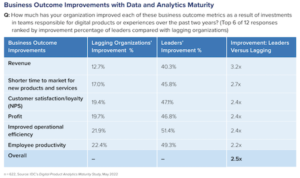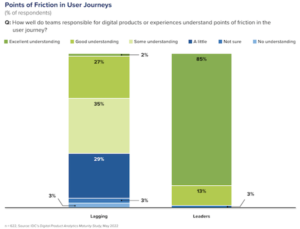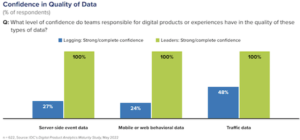Digital insights specialist Heap has announced findings from its newly released sponsored IDC white paper, “How Data Maturity and Product Analytics Improve Digital Experiences and Business Outcomes.” The paper found that the companies with the most data maturity saw 3.2x greater revenue and 2.4x greater profit than less mature companies.
IDC defines data maturity as how well a company uses data and leverages it in its decision making. Many organizations are assessing their data maturity as a way to compare data capabilities and progress against their peers, as well as achieve goals like greater operational efficiency and customer loyalty. Evaluating data maturity can help to shape data best practices and identify the gaps in processes towards these goals. In addition, using product analytics technology can help companies to better use their data to increase data maturity.
Heap’s sponsored IDC white paper, based on a survey of 626 product builders and data scientists, addresses how factors across people, processes, and technologies affect an organization’s data maturity and business results. The paper found that data maturity can provide up to a 2.5x increase in business outcomes across the board, including increased revenues, profits, and operational efficiency, along with higher customer loyalty and value as measured by net promoter scores.
Heap lists the report’s key findings as the following:
- 98.4% of most mature firms have a good to excellent understanding of customer journey friction points, while only 29% of least mature firms reported they have a good to excellent understanding in this area.
- Over 84% of teams at mature organizations get answers in minutes or hours compared to only 3% of the less data mature companies.
- Leaders are more than 2x as likely to report that leveraging data for personalization was either “easy” or “somewhat easy” compared to those lagging.
- 76% of top teams have a single source of truth for data compared to only 3% of least mature organizations.
- Over 89% of top teams agree their organization celebrates learning from experimentation while 77% of lagging companies feel their organization does not celebrate experimentation.
- Over 80% of top performing teams have fully automated data validation, have clearly defined policies on who can access the data, and have the ability to control data management.
“In today’s challenging market, efficient growth drivers are more important than ever,” said Ken Fine, CEO of Heap. “[The]‘How Data Maturity and Product Analytics Improve Digital Experiences and Business Outcomes’ white paper indicates that data-driven insight is a catalyst for business progress leading to profit and revenue increases, shorter time to market, better NPS scores and improved operational efficiency.”
While the paper highlights the potential returns of data maturity, it also pinpoints opportunities for improvement. One issue is data access, and while leading companies reported having “strong” or “complete” access to data, only a little over half of organizations in the early stages of their data maturity journey described having the same degree of access. Also of note is an underutilization of data, with 73% of companies disclosing how they feel they could do more with their data. For 70% of those surveyed, data is only used as a measure of success or failure for major initiatives, and 69% reported that decisions are driven by the highest paid person with little or no regard for data.
The report also discovered that less mature organizations are paradoxically more satisfied with their available data and that 70% of companies who are lagging behind believe they are on par or ahead of competitors in terms of data maturity. Those lagging companies also lack the tools for improvement, with 65% reporting an inability to identify specific areas of friction for their users.
Heap was founded with better utilization of user data in mind. Founders Matin Movassate and Ravi Parikh had the goal of building an end-to-end data collection and analytics system to enable companies to gain insight from the user data connected to web and mobile properties. The platform automatically collects user interaction data and then utilizes an ontological system to semantically label which elements of an interface are to be monitored. Data is then visually represented for easier querying on the same interface in which it is collected. Users can apply the labels retroactively on top of their raw datasets to uncover insights they may not have even been looking for through different analytic options like funnel analysis, retention analysis, and cohort analysis. On top of this, the software offers an “effort analysis” tool that can automatically show which parts of an interface are giving users the most trouble and why.
Since data collection and labeling are kept separate on its platform, Heap says that data governance, a driving factor in data maturity, is easier to attain. The company notes its automated data governance features ensure that data is kept in an organized and accurate system, as data from every event fits into a data structure from the moment it is collected.
Heap’s sponsored IDC white paper concludes that in order to compete in today’s digital landscape with its demanding customer experience needs, companies need to invest in digital product analytics tools to increase their data maturity and business outcomes. Though some data access and governance challenges remain, these tools can provide the insight and automation needed to achieve the biggest value from digital initiatives.
“These findings should be a wakeup call for businesses who want to efficiently grow their business and retain their customers for longer periods of time,” said David Wallace, IDC Research Director, Customer Intelligence and Analytics. “As reported, businesses that are most data mature enjoy a 3x increase on revenue versus companies that are the least data mature. Our study illustrates not only the importance of data maturity but why a data-driven culture is critical to success today, under any market conditions.”
Find the white paper here.
Related Items:
New Study Finds Data Intelligence Maturity Drives 3x Better Business Outcomes
The Evolution Toward Data Maturity
Heap Helps Avoid ‘Adobe Blackouts’ with Hosted Analytics
The post Report: Data Mature Organizations See 3x Greater Revenue appeared first on Datanami.



0 Commentaires